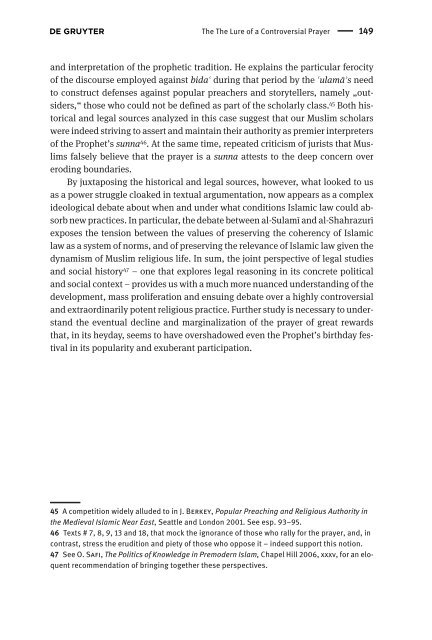0021-1818_islam_98-1-2-i-259
0021-1818_islam_98-1-2-i-259
0021-1818_islam_98-1-2-i-259
You also want an ePaper? Increase the reach of your titles
YUMPU automatically turns print PDFs into web optimized ePapers that Google loves.
The The Lure of a Controversial Prayer 149<br />
and interpretation of the prophetic tradition. He explains the particular ferocity<br />
of the discourse employed against bida^ during that period by the ^ulama#s need<br />
to construct defenses against popular preachers and storytellers, namely „outsiders,“<br />
those who could not be defined as part of the scholarly class. 45 Both historical<br />
and legal sources analyzed in this case suggest that our Muslim scholars<br />
were indeed striving to assert and maintain their authority as premier interpreters<br />
of the Prophet’s sunna 46. At the same time, repeated criticism of jurists that Muslims<br />
falsely believe that the prayer is a sunna attests to the deep concern over<br />
eroding boundaries.<br />
By juxtaposing the historical and legal sources, however, what looked to us<br />
as a power struggle cloaked in textual argumentation, now appears as a complex<br />
ideological debate about when and under what conditions Islamic law could absorb<br />
new practices. In particular, the debate between al-Sulam\ and al-Shahrazur\<br />
exposes the tension between the values of preserving the coherency of Islamic<br />
law as a system of norms, and of preserving the relevance of Islamic law given the<br />
dynamism of Muslim religious life. In sum, the joint perspective of legal studies<br />
and social history 47 – one that explores legal reasoning in its concrete political<br />
and social context – provides us with a much more nuanced understanding of the<br />
development, mass proliferation and ensuing debate over a highly controversial<br />
and extraordinarily potent religious practice. Further study is necessary to understand<br />
the eventual decline and marginalization of the prayer of great rewards<br />
that, in its heyday, seems to have overshadowed even the Prophet’s birthday festival<br />
in its popularity and exuberant participation.<br />
45 A competition widely alluded to in J. Berkey, Popular Preaching and Religious Authority in<br />
the Medieval Islamic Near East, Seattle and London 2001. See esp. 93–95.<br />
46 Texts # 7, 8, 9, 13 and 18, that mock the ignorance of those who rally for the prayer, and, in<br />
contrast, stress the erudition and piety of those who oppose it – indeed support this notion.<br />
47 See O. Safi, The Politics of Knowledge in Premodern Islam, Chapel Hill 2006, xxxv, for an eloquent<br />
recommendation of bringing together these perspectives.


